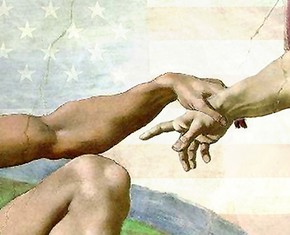The views expressed in our content reflect individual perspectives and do not represent the authoritative views of the Baha'i Faith.
The True Prophet … alone can enlighten the souls of human beings, so that with their eyes they may plainly perceive the way of salvation. For otherwise it is impossible to come to know divine and eternal things, unless one learns from that true prophet. – St. Peter, Recognitions of Clement 1:16.
In early antiquity, Christianity not only spread far and wide, it diversified.

St. Peter
Therefore, we can’t overgeneralize about early Christian beliefs. Although faith in Jesus Christ resided at the heart of all sects of Christianity in ancient times, yet particular doctrines and beliefs varied widely. One fascinating text is the first great Christian historical novel: The Homilies of Clement and its other version, the Recognitions of Clement. Since we began this series with this very text, let’s now compare the doctrine of evil, as presented in the Clementine literature, and compare it from a Baha’i perspective.
As pointed out earlier in this series, in the Homilies of Clement, and the Recognitions of Clement as well, the figure of St. Peter debates with Simon the Magician. Basically, these debates represent a competition between the claims of ancient philosophy and astrology, versus prophetic knowledge as revealed by Jesus Christ. Christ, throughout this literature, is referred to as “The True Prophet,” as seen in the opening quote above.
In one of these debates, St. Peter (whose original name was Simon) and Simon the Magician hotly debate the question of the origin and existence of evil. Much of their discussion focuses on the specious sophistry of philosophical discourse, in contrast to the enlightenment brought by the True Prophet.
Peter opens with a Socratic question:
And Peter: “Is then evil the same as pain and death?”
And Simon: “It seems so.”
Simon the Magician takes the rhetorical bait. Peter then explains the paradox of evil, which exists, but not always:
And Peter said: “Evil, then, does not exist always, yea, it cannot even exist at all substantially; for pain and death belong to the class of accidents, neither of which can co-exist with abiding strength.
For what is pain but the interruption of harmony? And what is death but the separation of soul from body? There is therefore no pain when there is harmony. For death does not even at all belong to those things which substantially exist: for death is nothing, as I said, but the separation of soul from body. – Homilies 19:20; cf. Recognitions 4:23; The Clementine Homilies (1870), p. 306.
This proposition, set forth with forceful clarity and compelling simplicity, holds that evil is relative. In other words, evil’s existence is conditional, existing only in relation to an absence of good. Therefore, evil has no substantial or absolute existence.
In the realm of human interaction, evil does not come from something external, but from something intrinsic to human nature: free will. The moral actor chooses based on what is right—not on what is most desirable or most expedient.
In the Baha’i teachings, Abdu’l-Baha advances a similar explanation resolving the paradox of how evil may be said both to exist, yet not exist:
One thing may be evil in relation to another but not evil within the limits of its own being. It follows therefore that there is no evil in existence: Whatsoever God has created, He has created good. Evil consists merely in non-existence. For example, death is the absence of life: When man is no longer sustained by the power of life, he dies. Darkness is the absence of light: When light is no more, darkness reigns. Light is a positively existing thing, but darkness has no positive existence; it is merely its absence. Likewise, wealth is a positively existing thing but poverty is merely its absence.
It is thus evident that all evil is mere non-existence. Good has a positive existence; evil is merely its absence. – Abdu’l-Baha, Some Answered Questions, newly revised edition, p. 304.
This argument has a sophisticated simplicity. Light is not the absence of darkness. Rather, darkness is the absence of light.
At this point, you may well ask: “So, if there is a fundamental agreement between this early Christian doctrine and the Baha’i perspective, why should I investigate the Baha’i teachings any further?” Good question! Excellent critical thinking. This deserves a worthy answer.
Truth be told, although Peter offers a sophisticated argument for resolving the paradox of evil—yet Peter still lived in the enchanted universe of two millennia ago, inhabited by demons and sprites.
Baha’is believe that not only are there no evil powers, there are no evil entities. This makes a world of difference. It also has a direct impact on our understanding of the person and work of Jesus Christ, if understood in a context in which Satan has no place and no reality.
You May Also Like
Comments

















Let’s take the nonexistence of evil in the absolute sense. It has certain pragmatic implications, which are not taken up “at our peril,” as you suggest. First of all, ...we can rule out evil principalities, such as Satan — or, God forbid, God, as a putative author of evil. (It all depends on which "theodicy" one subscribes to.) See “Why Did God Allow the Holocaust? (Wrong Question)” and “Satan’s Epitaph” and “The Life and Death of Satan” (other articles of mine on Baha’i Teachings). That shifts the blame back to we as humans, who are the moral actors, for good and for evil.
Baha’u’llah’s “Fire Tablet” is a catalog of evils. And consider this prayer by Abdu’l-Baha: “But a thousand times alas, that man is negligent and unaware of these facts, and daily doth he strut abroad with the characteristics of a wild beast. Lo! At one moment he turneth into a ferocious tiger; at the next he becometh a creeping, venomous viper! . . . [W[hen he engageth in warfare, quarrelling and bloodshed, he becometh viler than the most fierce of savage creatures, for if a bloodthirsty wolf devoureth a lamb in a single night, man slaughtereth a hundred thousand in the field of battle, strewing the ground with their corpses and kneading the earth with their blood.” (Selections, pp. 287-288.)
You wrote: "I would suggest interested readers might devote some time to a reading of Romans, ch. 5-8, which is the foundational basis of reformed Christian theology and in which the subject of evil and human conduct is confronted directly." I respectfully submit that Paul is dealing with the problem of sin, which he sees as the human predicament, for which atonement provides a solution. However, atonement, standing alone, is not a solution to the problem of evil, especially since Paul's statement, "being now justified by his blood, we shall be saved from wrath through him" (Romans 5:9) is predicated on "Wherefore, as by one man sin entered into the world, and death by sin; and so death passed upon all men, for that all have sinned" (Romans 5:12), i.e. what later evolved into the doctrine of Original Sin, which the Baha'i Writings reject:
"Note that if these words were taken literally, as imagined by the people of the Book,97 it would be sheer injustice and absolute predestination. If Adam sinned in approaching the forbidden tree, what then was the sin of glorious Abraham, the Friend of God, and the error of Moses, Who conversed with God? What was the offence of Noah the Prophet and the transgression of truth-speaking Joseph? What was the fault of the Prophets of God and the failure of John the Chaste? Would divine justice have suffered these luminous Manifestations to endure, by reason of Adam’s sin, the torment of hell until such time as Christ should come and by His sacrifice rescue them from the nethermost fire? Such a notion is beyond the pale of every rule and principle, and no rational person can ever accept it." (Some Answered Questions, Chapter 30, Paragraph 10.)
In other words, man can be “viler than the most fierce of savage creatures.” Therefore, evil exists, relatively speaking. However, metaphysically speaking, man is not evil in the absolute sense. Thus the paradox of the existence and non-existence of evil is that of relative and absolute dimensions. These are complementary perspectives. Both are needed to properly and pragmatically address the problem of evil.
No small measure of my difficulties stems from my strong personal interest in the history of the 20th century, particularly those historical periods involving war, and separately, my studies of reformed Christian theology. Both subjects point strongly and convincingly towards the existence of evil.
I will omit a discussion of Christian theology relative to the existence of evil, in favor of the empirical evidence of recent history, ...which is well documented and not subject to theological debate. Having said that, I would suggest interested readers might devote some time to a reading of Romans, ch. 5-8, which is the foundational basis of reformed Christian theology and in which the subject of evil and human conduct is confronted directly.
The history of the 20th century is rife with examples of evil on a massive scale. The Holocaust, with its 11 to 15 million victims, is well known but even its tragic toll is dwarfed by the combined death toll of the century's three most brutal totalitarian regimes - Nazi Germany and the Communist regimes of Vladimir Lenin and Josef Stalin in the Soviet Union and Mao Tse Tung in Red China - which are believed to have claimed the lives of some 117 million or more people, virtually all being their own citizens and largely innocent of any real, criminal wrongdoing.
As I consider the above, and lesser atrocities such as the Armenian genocide and the Khmer Rouge pogrom in Cambodia, I find myself very hard pressed to accept evil as being nothing more than an absence of good. Death tolls on the scale of the above cry out sorely for the treatment of evil as something more substantial than a philosophical construct.
While it is true that certain human hearts and souls can well be characterized as being without good, it must also be born in mind that nature abhors a vaccum and in the absence of good in the human heart, something else will most certainly seek to fill that void.
The evidence of human history and the doctrinal core of divinely revealed scripture provides me with abundant proof that evil is very much real and we would dismiss its reality at our peril.